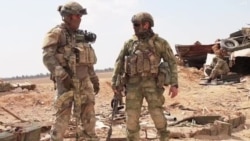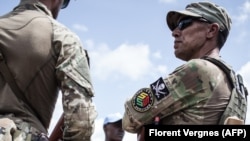On August 19, Russian Foreign Ministry spokeswoman Maria Zakharova denied allegations made in a news report about human rights abuses and looting by mercenary troops from the Wagner Group, a Russian private military company, in the Central African Republic (CAR).
The Bloomberg News story cited witness who said soldiers in one March incident killed at least a dozen miners in eastern CAR. The witnesses said they saw Russian-speaking soldiers. The attackers "killed randomly and looted, taking everything including property, money and gold," one man told Bloomberg.
Zakharova claimed that Russia’s involvement in CAR is part of a broader international effort to strengthen the country’s law enforcement agencies “to maintain security, law and order.”
“Such articles are purely unfounded and involve unscrupulous methods such as the fabrication of facts. The goal clearly is to tarnish Russia’s image,” Zakharova said.
That is false. The reports are far from unfounded; multiple news organizations and human rights groups have reported on claims of human rights abuses by Wagner troops and accusations that Wagner forces are looting precious metals, mainly gold.
Albert Yaloke Mokpeme, spokesman for the CAR presidential office, told Bloomberg that Wagner mercenaries are not operating in the country. But he confirmed that “unarmed Russian trainers” have been assisting the CAR army in its fight against rebels forces.
“Central African armed forces, helped by Russian and Rwandan allies, have succeeded in pushing the rebels back and taking back a significant part of the national territory and illegally occupied mining sites,” Mokpeme said.
Mokpeme’s claim that Russia is not present in CAR is ludicrous. In a special investigation published in 2019, titled “Putin’s Private Army”, CNN reported:
“There’s nothing secret about Russia’s presence in the Central African Republic. The streets are plastered with propaganda posters proclaiming, “Russia: hand in hand with your army!” A local radio station churns out Russian ballads and language lessons. New recruits to the army are being trained in Russian, using Russian weapons…”
“A months-long CNN investigation has established that this ambitious drive into the heart of Africa is being sponsored by Yevgeny Prigozhin – an oligarch so close to the Kremlin that he is known as President Vladimir Putin’s 'chef'. He was sanctioned by the U.S. for funding the Internet Research Agency that meddled in the 2016 presidential election.”
The list of similar news reports on Wagner in CAR is long. And that is not to mention allegations of Wagner abuses in other African nations.
U.S. officials have said Prigozhin controls Wagner and a host of related enterprises operating in Africa, along with the Internet Research Agency, the infamous St. Petersburg troll farm accused of interfering in the 2016 U.S. presidential election.
For 20 years, CAR has struggled with various rebel groups. In 2017, CAR President Faustin-Archange Touadera turned to Russia to secure weapons and military advisers, including Wagner mercenaries, to reinforce his army’s operations.
Today, Russian advisers have the “government’s ear” in political and economic affairs, wrote Pauline Bax, Africa program deputy director at the International Crisis Group. International organizations, including the United Nations, have tried to sound the alarm.
In March 2021, a group of U.N. experts cited violent attacks on civilians by private military groups operating with CAR armed forces, including Wagner and Lobaye Invest, another Russian company controlled by Prigozhin.
According to the U.S. Treasury Department, which sanctioned Prigozhin and Lobaye Invest in September 2020, the company “was founded in CAR in October 2017 and specializes in the extraction of gold and diamonds, both lucrative exports of CAR.”
Citing reports of atrocities, the U.N. experts in 2021 said they were “disturbed” to learn about the “interoperability” of the Russian companies with the U.N.’s peacekeeping mission in CAR:
“This blurring of the lines between civil, military and peacekeeping operations during the hostilities creates confusion about the legitimate targets and increases the risks for widespread human rights and humanitarian law abuses …”
“Unacceptably, there seem to be no investigations and no accountability for these abuses. The close connections between the various actors, along with the lack of transparency, further jeopardizes chances of any impartial investigation and ensuring accountability for those abuses and violations.”
More recently, an August 5 press release by the U.N.’s independent expert on the human rights situation in CAR stated that “Russian allies” and CAR armed forces allegedly “provided support and backing” to militia that “committed atrocities” in the town of Boyo, “including beheadings and sexual violence, and forced thousands of residents to flee.”
The Wagner Group has been accused of rights violations in several African countries.
In May, Human Rights Watch (HRW) said that since 2019, CAR civilians have been summarily executed, tortured and beaten by forces identified as Russian. Victims and witnesses told the group the abuses were committed by Russian-speaking white men carrying military weapons.
“There is compelling evidence that Russian-identified forces supporting the Central African Republic’s government have committed grave abuses against civilians with complete impunity,” said Ida Sawyer, crisis and conflict director at HRW.
In August, The Africa Report, an English-language publication, said Wagner mercenaries have been actively mining since 2018, especially gold and diamonds, mainly through Lobaye Invest.
The Africa Report said Wagner is expanding beyond mining into the forestry and food sectors, including sugar, coffee and alcohol.
In June, Britain's The Guardian newspaper interviewed witnesses in Sudan who said that armed fighters identified as Wagner mercenaries carried out bloody attacks on artisanal miners along the border between CAR and Sudan. Witnesses said the mercenaries opened fire on migrant gold miners from Sudan and Chad.
“Since arriving in CAR four years ago to defend the government against rebels, the Wagner Group has made efforts to establish control over the flow of gold and diamonds,” The Guardian reported.
In July, CNN republished a report on a Russian scheme to plunder gold in Sudan to bolster the Russian economy in the face of Western sanctions over the war on Ukraine.
The gold was flown to Moscow, CNN said.
CNN, working with the Dossier Center, which tracks the criminal activities of Kremlin associates, reported that a “high-level Wagner operative,” Alexander Sergeyevich Kuznetsov, has “overseen operations in Sudan’s key gold mining, processing and transit sites in recent years.”
That report said Prigozhin also ran a shadowy company in Khartoum called Meroe Gold, “which extracts gold while providing weapons and training to the country’s army and paramilitaries.” Meroe Gold was sanctioned by the U.S. Treasury in July 2020.
Correction: This fact check wrongly said Bloomberg had interviewed 100 witnesses in CAR for its August 16 report. That has been corrected. Polygraph regrets the error.







